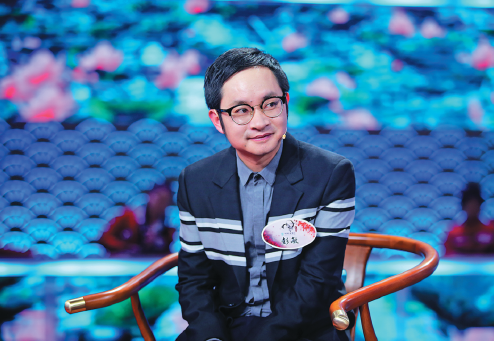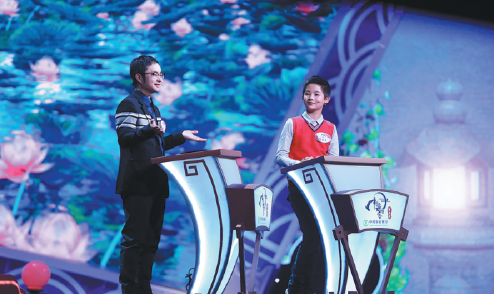Well versed
After two failed attempts at the competition final, Peng Min has finally conquered CCTV's Chinese Poetry Conference, rounding off a stellar collection of culturally-themed television championship titles, Li Yingxue reports.

The winner of the fifth season of the China Central Television's Chinese Poetry Conference was unveiled on Feb 9. Peng Min, who has fallen at the final hurdle twice before, finally claimed the crown for himself.
The show gathers enthusiasts of ancient Chinese poems who have to tap into their knowledge of the art form to compete against one another in a series of puzzles and quizzes. These included a round where contestants had to guess the stanzas of poems based on pictures painted on the spot by one of the judges.
Another challenge saw competitors, given a word, face off against each other by having to recite the stanza of a poem with that word in-going back and forth like a tennis rally with words.
The competitors vary in age, from teenage students to professional adults. Peng, 36, an associate senior editor of a poetry magazine, is one of the most familiar faces and most competitive participants of the show. He can recite around 1,000 poems.
With a master's degree in literature, Peng is always the hot favorite to win the trophy, but, surprisingly, he's lost two finals in a row-the second season he lost to a 16-year-old high school student, Wu Yishu, and in the third season he was beaten by deliveryman Lei Haiwei.
He cried after losing the season three final, prompting a lot of hurtful abuse and mockery online, which he wisely chose to ignore. The pain of the previous two losses meant that he skipped the fourth season of the show.
"I eventually realized that if I compete and fail again, at least I've tried, but if I don't sign up, that means I'm more of a failure because I'm afraid of trying. Therefore, when season five came around, I decided to give it another go," Peng recalls. He admits that he was already considering whether or not he would join for season six if he failed to win this time around.
The season five final came down to Peng and 11-year-old Han Yaxuan-again he was facing a much younger rival. This time, though, there was to be no mistake and victory was finally his.
"I want to tell people who have a similar experience that, even though you go through all kinds of misfortune or difficulties, as long as you are brave enough to look up, there will always be a light in the sky to guide you out of the darkness," Peng said in his acceptance speech.
"Thousands of years later, all of our shadows will have vanished, only the beauty of poems will last."
He holds all of the finalists in high regard, noting that he believes they are all at the same high level. It's the skill of ability to answer under stress and the psychological state of the contestant that decides the winner.
"The previous two times I might have been too confident and I lost because of impatience, which makes me realize that there are many strong competitors, especially the younger ones. This time I told myself to calm down and try not to make any mistakes," Peng says.
Before the final, Peng asked advice from his friend Chen Geng, the season four champion. Chen is also the only competitor to have participated four consecutive times, before finally winning last year.
"Chen told me to not think of it as a final, but just a normal challenge so that I wouldn't feel too nervous," Peng recalls.
Bao Ge, one of the directors of the show, noticed Peng's nervousness. "He said he was starving during the final, which may be caused by the nerves," Bao says.
Bao was impressed by Peng's attitude and hard work during the competition. "Whether on the way to or from the studio, or resting in the winner's room-a special area for the victor of each episode to prepare for the next round-he was always on his laptop," Bao says.
"And he was not keeping the materials to himself. When waiting for the recording to start, he would help the young competitors and they would prepare for the competition together," Bao recalls.
Peng enjoyed communicating with the other contestants, and he is glad to see so many younger poetry aficionados popping up.
"That might be because the show has encouraged more elementary and middle school students to learn about Chinese poetry, which is a good sign," Peng says.
Literary youth
Born and raised in Hengnan county, Hengyang, Hunan province, Peng fell in love with ancient Chinese poetry when he was a child and literature has always been part of his life.
After he received his master's degree from the Department of Chinese Language and Literature of Peking University in 2009, Peng became an editor at the poetry magazine, with a monthly salary of around 2,000 yuan ($286).
He didn't even try to find a higher paying job, because working in literature was all he wanted. For 11 years, it's the only job he's ever done.
"I've thought of giving up, but then I realized that I couldn't bear to do anything else," Peng says.
Peng notes that poetry brings him company and comfort, especially when he is alone. "Watching TV or playing games will eventually bore me, but classical Chinese poems can offer a 'conversation' with souls from ancient times," Peng says.
"You can feel the joy, anger, sorrow and happiness, and you can always find a similar plight to your own among the poems, which can help bring comfort in tough times."
Peng also likes to read novels and histories. Recently he has immersed himself in books by prominent Sinologists, such as American historian Stephen Platt's Autumn in the Heavenly Kingdom: China, the West, and the Epic Story of the Taiping Civil War.
Peng used to write his own poems when he was in college, but stopped when he started working. In 2016 he published a book of his prose, under the theme "all the mocked dreams will make you shine one day".
He is now running a WeChat account writing about the stories and history of ancient Chinese poems and poets.
Some literature lovers pursue a professional route to become a professor of research or to teach, while Peng says he takes the more popular track-he started to take part in culturally-themed TV shows in 2013.
"Doing research is too rational for me, as I'm an emotional person," Peng explains.
In 2015, he won the Chinese Idiom Conference and Chinese Character Dictation Conference. He took five months to recite the whole Chinese Idiom Dictionary which collects more than 10,000 Chinese idioms.
"As a literary youth, the preparation for that competition gave me a chance to solidify the foundation of my Chinese. Without the competition I could never go through every single Chinese idiom," Peng says.
Having appeared in, and won, almost every culturally-themed TV show of the past decade, he now has a new goal-to join the talk show and debate competition, U Can U Bibi.
"I want to improve my language expression, and that talk show might be a good opportunity to do so," he says.


Today's Top News
- Foreign ministers of China, Egypt call for Gaza progress
- Shield machine achieves Yangtze tunnel milestone
- Expanding domestic demand a strategic move to sustain high-quality development
- Xi hears report from Macao SAR chief executive
- Xi hears report from HKSAR chief executive
- UN envoy calls on Japan to retract Taiwan comments






























